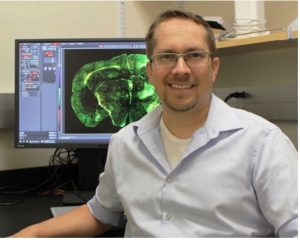
In Profile: Kristian Doyle
 Who are you and where are you based?
Who are you and where are you based?
My name is Kristian Doyle and I’m an Associate Professor at the University of Arizona. My primary appointment is in the Department of Immunobiology but because my research is very cross-disciplinary I also have appointments in the Department of Neurology, the Department of Psychology, the Department of Neurosurgery, and the Arizona Center on Aging. Originally, I’m from the UK and I did my undergraduate research at the University of Sussex. I moved to the US for graduate school and completed a PhD in Molecular Microbiology and Immunology at Oregon Health & Science University. My postdoctoral research was with Dr. Marion Buckwalter at Stanford University.
Can you briefly describe the research that you do?
Since my postdoctoral research with Dr. Buckwalter I’ve been interested in the chronic inflammatory response to stroke. This is an exciting area to be in because for several months after stroke there is a smoldering inflammatory response in the brain at the site of the infarct. We think that there are drugs either in development or currently in clinical use for other diseases that could help put out the embers of this inflammatory response and promote a faster recovery.
The basic science research in my lab is focused on discovering why the inflammatory response to stroke takes so long to resolve, and the translational research is focused on testing some of these drugs in the stroke models being used by the network. A drug I’m particularly excited about is 2-hydroxypropyl-β-cyclodextrin (HPbCD), a compound that can solubilize and entrap lipophilic substances, as well as promote transcriptional reprogramming of macrophages to help them process lipids. We think this molecule helps mitigate lipid overload in stroke infarcts that have become overwhelmed by the large quantities of cholesterol and other lipids generated by myelin breakdown after stroke.
What is your role in the Stroke IMPaCT Network?
I am the preclinical coordinator for the network. This means that I am responsible for facilitating and coordinating the multi-site preclinical studies.
What are you enjoying most about being part of this network?
I really enjoy interacting with so many other people who are just as passionate about investigating the inflammatory response to stroke. The support provided by the Leducq Foundation enables us to get together multiple times every month. At these meetings I always learn something new and am buoyed by the positive energy of the group. It’s clear that we are all pulling in the same direction, trying to achieve our common goal of developing treatments for stroke patients. It’s also a great experience for my trainees as it gives them a broader foundation of knowledge about stroke research and opens up new training opportunities for them.
What else do you enjoy doing/ anything else you’d like to share?
Outside of the lab I enjoy biking, camping, and road trips with my family. The southwest of the United States is a diverse and beautiful part of the country. Tucson in particular is fantastic, we get snow in the winter, desert heat in the summer, and great food all year round.






0 Comments